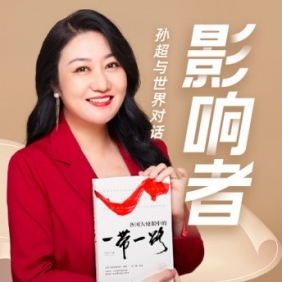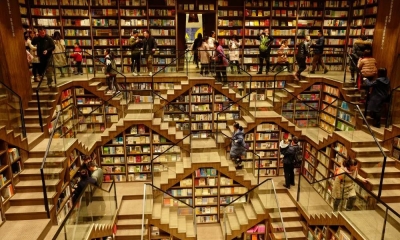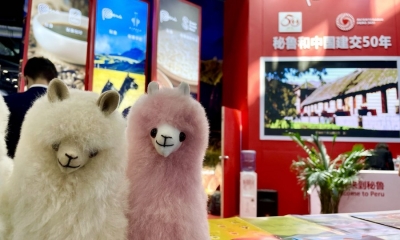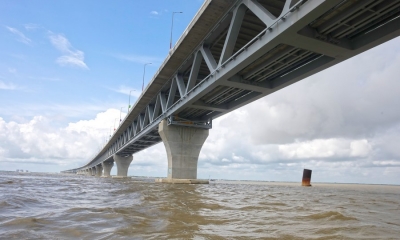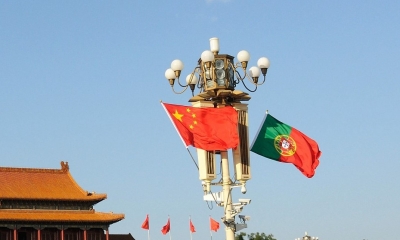Finance Minister of Sierra Leone: A Friend in Need Is a Friend Indeed
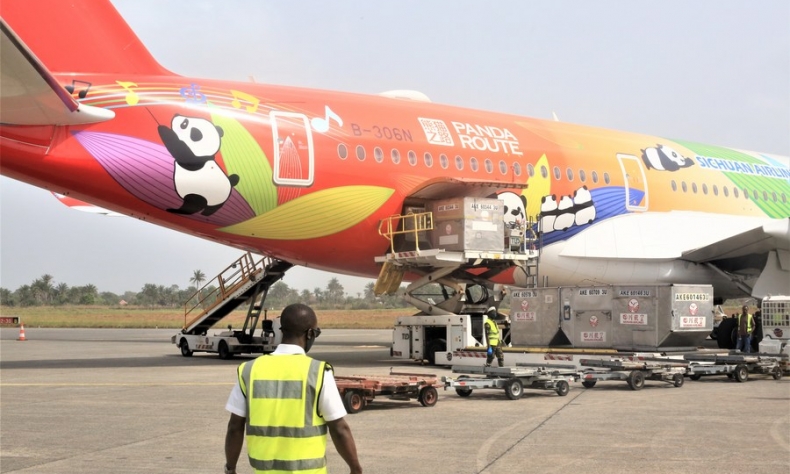
Our friendship, spanning more than 50 years, is flourishing due to the trust shared between our two nations.
Editor’s Note: At the invitation of Chinese President Xi Jinping, President of the Republic of Sierra Leone Julius Maada Bio paid a state visit to China between February 27 and March 2. President Bio was the first African state leader visiting China in 2024. The visit opens a new era for consolidating bilateral relations and promoting diversified cooperation, and also deepens the comprehensive strategic partnership. During the visit, Minister of Finance of Sierra Leone Mr. Sheku Ahmed Fantamadi Bangura received an interview with Sun Chao, the author of “Ambassadors’ views on Chinese Modernization”. Authorized by Sun Chao, the excerpts of the interview are published by China Focus.
Sun Chao: Mr. Minister, is this your first time visiting Beijing? What has made the most significant impression on you during this visit?
Minister Bangura: It is truly an honor to visit China on this presidential state visit and to further deepen our cooperation. This is my second time visiting China. I am deeply impressed by the depth of China’s development, and I also admire the humility with which Chinese people embrace and contemplate this progress, as well as their willingness to share their developmental journey with people from other parts of the world.
During this trip, I had deeper engagements across various government sectors. This is because we are striving to foster economic cooperation. We signed several economic cooperation agreements in different areas that our two presidents agreed to enhance their engagement in. This includes the areas of infrastructure, resource management, and energy. Additionally, there’s the area of fiscal policy, which includes tax incentives for businesspeople, as well as financial cooperation between banks, our central bank and your central bank, and commercial banks to facilitate business transactions and currency swaps, considering the size of our trade volume as well. Additionally, there’s also the transfer of health knowledge, along with advancements in the field of education.
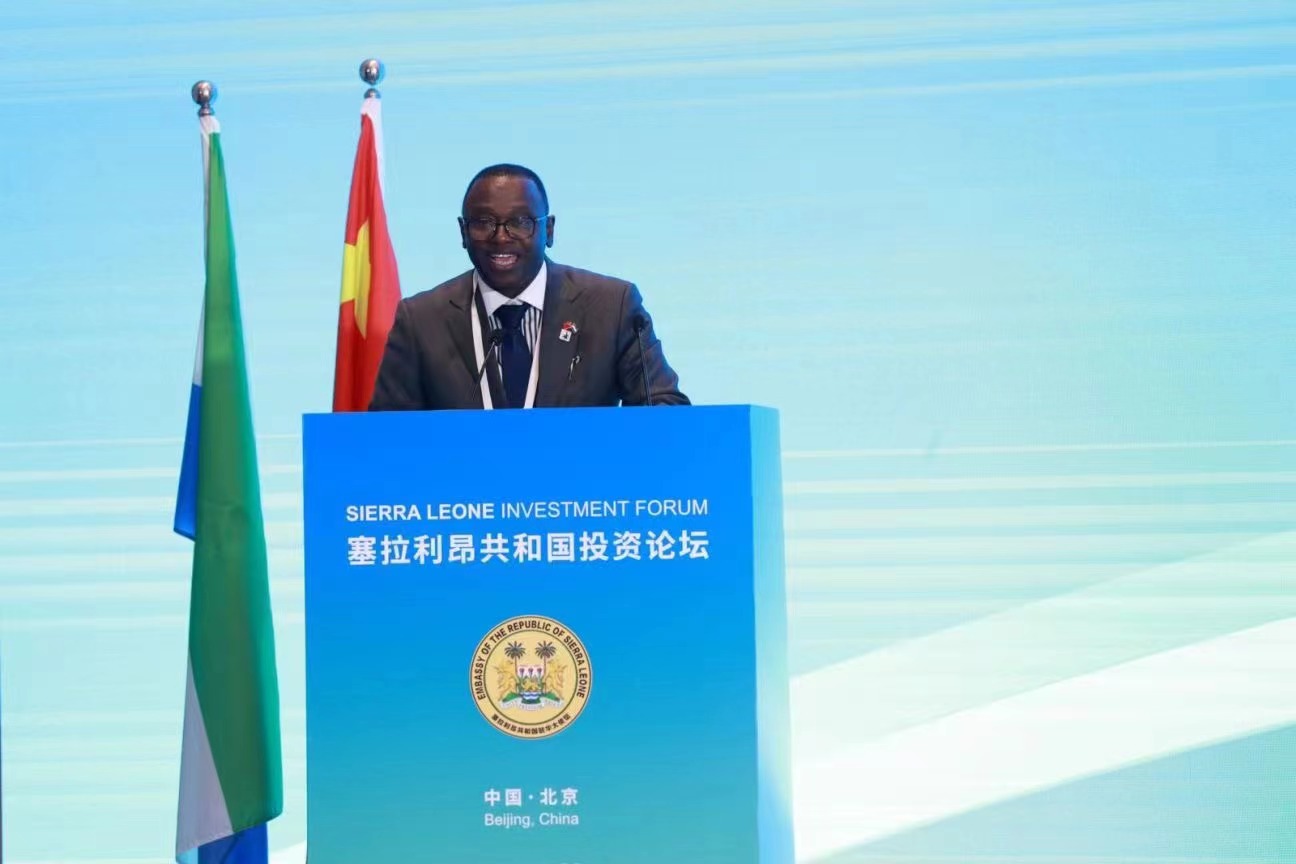
My most profound impression from interactions with the Chinese government is their humility and trust, and their selflessness in sharing knowledge and resources, assisting other nations to accelerate their development without undergoing the same lengthy learning processes they experienced in economic transformation. Throughout my visit, I encountered straightforward and open communication. This transparency reinforces my belief that our collaboration with China will continue to deepen and expand significantly.
Sun Chao: I am surprised at your insightful opinions and profound understanding of China, given that this is your second visit to the country. How do you view Chinese modernization and how does your country pursue its own path to modernization?
Minister Bangura: Our country has engaged in bilateral cooperation with China for over 50 years. However, the rapid pace of China’s development and our burgeoning trade and investment relationship with China have inspired our president to seek an even deeper level of cooperation with the Chinese government and its people.
My first visit to China was in May 2023, when I traveled to Beijing on an official trip to lay the groundwork for my president’s visit. I was deeply impressed by the rapid pace of development in China. During that visit, I had the opportunity not only to explore Beijing but also to travel to see the Hong Kong-Zhuhai-Macao Bridge. This experience was particularly impressive because my president is keen on advancing our country’s infrastructure, especially inspired by projects like the bridge that spans the estuary, connecting areas separated by the Atlantic Ocean.
My visit to China made a profound impact on me. However, it wasn’t just the infrastructure development that was striking. It was also the peace and harmony among the people, as well as the humility of the Chinese in their approach to development and their willingness to share their experiences and knowledge. I understand that the Chinese development philosophy advocates for each country’s right to chart its own course. They have their own path, and I think they are eager to share their insights with those who are willing to listen and learn.
In terms of modernization, I’ve observed rapid advancements in China, particularly in infrastructure. China has embraced the 21st century development, as evidenced by the numerous green buildings. These structures across the country exemplify China’s efforts to demonstrate their deep understanding of and interest in contributing to making the world greener.
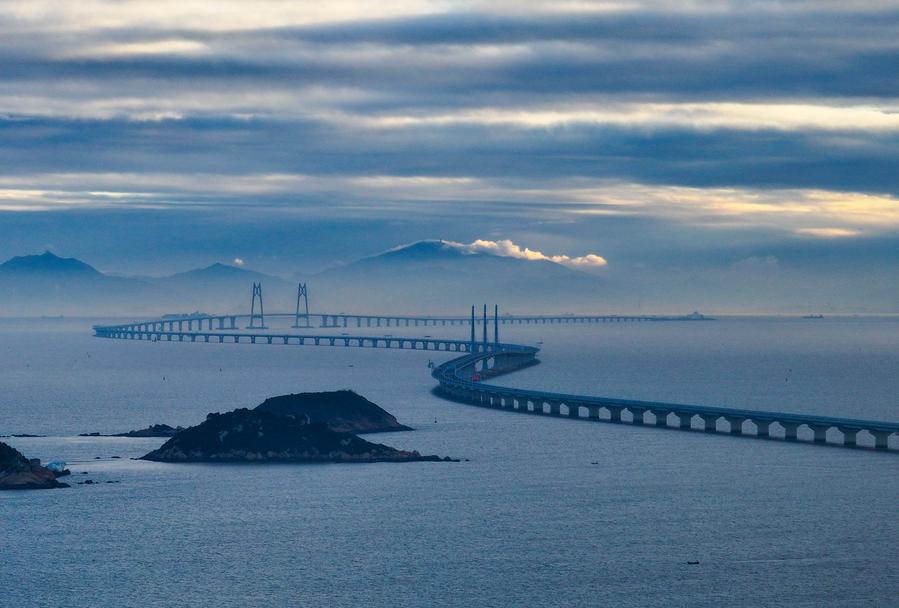
Sun Chao: What are your opinions on the Belt and Road Initiative (BRI) and the further participation in the BRI?
Minister Bangura: In 2018, my country joined the Belt and Road Initiative, an endeavor championed by our president during his visit to Beijing. I view the initiative as a strategic move, particularly in driving developmental transformations. It serves as a bridge between nations, enhancing trade and the exchange of knowledge. Furthermore, it fosters a mutual understanding in diplomacy, alongside the shared goals of transferring technology and cultural values, which I find exceptionally impactful.
I have observed, particularly in Africa, the transformative impact of infrastructure developments beyond just railways, as part of the Belt and Road Initiative. This initiative is a progress in numerous developing nations. My awareness extends to the developments in Kenya, Tanzania, and the ongoing advancements in Ethiopia, which include connecting Djibouti and Ethiopia via a rapid electric train. This connection not only facilitates goods movement from Djibouti to Ethiopia, but also opens significant trade opportunities. This type of transformative collaboration allows countries to exchange technology, knowledge, and cultural values while maintaining respect for each nation’s sovereignty. The Chinese government’s willingness to engage with and support other countries without imposing or interfering in their development paths is commendable. Their approach, which is both generous and humble, fosters mutual growth and respect, irrespective of a country’s size.
I perceive significant potential for my country within the framework of the Belt and Road Initiative. Our presence here is underpinned by a unique perspective: we see beyond the conventional bilateral cooperation that typically emphasizes grants or development aid. We are convinced that there lies a vast potential for accelerated transformation. This can be achieved by encouraging business-to-business collaborations, enabling partnerships that foster research and development, and promoting investment in various nations. Such an approach not only broadens the scope of opportunities but also drives sustainable development and investment in our countries.
Sierra Leone is rich in resources. Despite our modest land area and population, our considerable natural endowments and strategic global positioning — equal distance from Europe, North America, Asia, and close to Latin America — offer significant advantages. We see a powerful opportunity to leverage this strategic position, especially in collaboration with China. Given the longstanding relationship built on trust and mutual benefit that we’ve shared with China for over 50 years, we are optimistic about our joint ventures. We anticipate that by engaging in a mutually beneficial manner and embracing the principles of win-win cooperation, we can significantly advance our development. Through the Belt and Road Initiative, and by capitalizing on our natural resources, we aim to accelerate our progress by facilitating the transfer of knowledge, technology, and financial resources. By combining our assets with the expertise, we are poised to expedite Sierra Leone’s developmental transformation effectively. I think the Belt and Road Initiative presents a valuable opportunity that we can greatly benefit. Our approach is rooted in a business-oriented perspective, aiming to capitalize on the cultural and commercial opportunities that exist between our two nations.
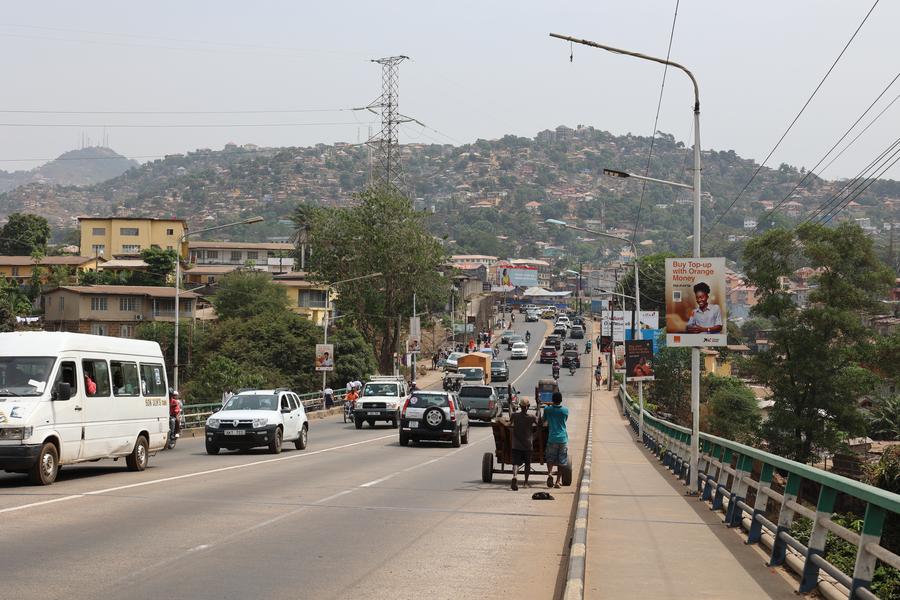
Sun Chao: What has the BRI brought to your country? How do you see the BRI’s role in promoting common development of the world?
Minister Bangura: This initiative ensures that we can seamlessly collaborate and view ourselves as a unified body. The Belt and Road Initiative provides China with a leadership opportunity and showcases China’s modernization. The infrastructure development and transformation, the rapid pace of technological advancement, and the move towards achieving net zero by fostering green investments in solar technology, and addressing pollution, are all commendable.
I think this is cutting-edge, and it is likely to continue. We, in developing countries, are very impressed by the humility of the Chinese people, their approach to development, and their willingness to share their experiences with us. This openness is crucial in how we engage with them. It is evident that as trade deepens, the Chinese economy and its leadership are very willing to open up.
When it comes to utilizing trade and investments, it is essential to have access to resources and finances for infrastructure development. This will greatly assist most of our developing countries. I believe that as a large economy, China’s development will significantly influence the global landscape. The recovery in China after the pandemic is very encouraging for the world, and it is important that they are opening up to engage with other countries on various platforms. We are eager and ready to participate.
Sun Chao: When the rest of the world talks about your country, what do you want them to know?
Minister Bangura: Our country, nestled on West Africa’s west coast, is located between Guinea and Liberia and is on the border of the Atlantic Ocean and a gem for tourists. We’re strategically placed halfway to Europe and within a reasonable distance from Asia. Our country is known for its beautiful beaches and rich biodiversity. Our mountains, draped in verdant greenery, are a sight to behold.
Despite that our country is small, we’re rich in mineral resources, opening doors to numerous investment opportunities. But what truly makes us stand out is our people. Hospitality isn’t just a word here; it’s our way of life. We pride ourselves on our openness and warmth, making visitors and business investors feel right at home.
On the business front, we roll out the red carpet with attractive incentives. And yes, our bond with China is noteworthy. China is our largest trading partner, accounting for 39 percent of our trade. This strong relationship underscores the vibrant exchange of goods and investments between our nations.
Even though China is much bigger than Sierra Leone, where we have about 8.5 million people, we’re doing some impressive things. Our dealings with Chinese companies are over half a billion U.S. dollars, showing how welcoming we are to Chinese businesses and investors. In Sierra Leone, we have beautiful islands with unique and touching histories, especially related to the European slave trade. These places provide a deep understanding of our country’s past and how we’ve evolved.

Sun Chao: Thank you. Could you talk more about trade relations between the two countries?
Minister Bangura: Regarding exports, we see a tremendous opportunity to attract Chinese investors. There is huge potential for transformative investments in the mineral sector, fisheries, and agriculture. In the project sector, new potentials are emerging, enhancing our society. While Congress is reporting on these developments, we can explore various financing methods, which I believe will be beneficial for trade as well.
I have interacted with numerous Chinese companies eager to invest in Sierra Leone. They are interested in forming joint ventures, particularly in the mineral sector, using those resources to bolster the country’s infrastructure. Such collaborations facilitate the transfer of technology, knowledge, finance, and expertise through authentic business-to-business or government-to-government interactions. This shift is not only different but transformative.
Sun Chao: This year marks the 24th anniversary of the establishment of the Forum on China-Africa Cooperation (FOCAC). China-Africa cooperation has become a model for South-South cooperation. I’m interested in your perspective on your country’s involvement in FOCAC.
Minister Bangura: FOCAC presents a platform for African leaders to engage with China and enhance diplomatic relations. Currently, our country holds a non-permanent seat on the United Nations Security Council, and our alliance with China is strengthened by our adherence to the One China policy. This stance facilitated support for China’s permanent representative position on the Security Council, a move we backed in the 1970s. We recognize China’s commitment to promoting South-South cooperation, which encompasses cultural exchange, technological transfer, and investment facilitation. Indeed, President Xi Jinping extended an invitation to our president, and we plan to attend the upcoming FOCAC meeting in September. We view this as a vital opportunity not only to interact with Chinese entities and the government but also to advance our collaborative efforts.
Additionally, there are various nations where the potential for multilateral collaboration exists, fostering a platform for developing countries to exchange knowledge and experiences, particularly in the Global South. This platform has proven beneficial for our nation, yielding tangible results. Through China’s aid, we’ve seen significant advancements, such as road construction in challenging terrains and investments in clean energy, notably solar power. Moreover, China’s support extends to cultural and humanitarian assistance, including food aid, educational initiatives, and scholarships for our children.
We’ve gotten considerable benefits from this cooperation, and now, there’s an opportunity to further enhance our economic ties through the Belt and Road Initiative, continuing our productive engagement with China.
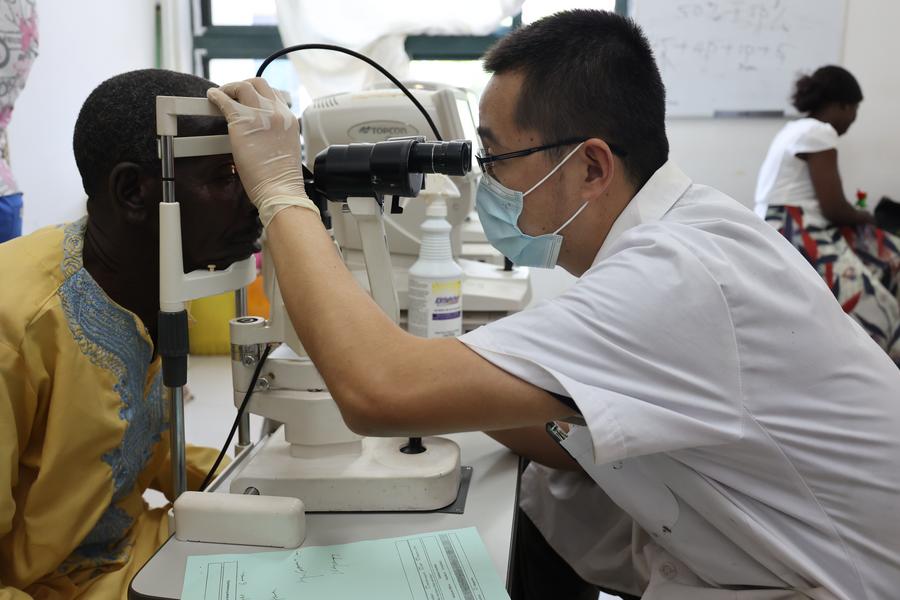
We are currently seated at the United Nations Security Council as a non-permanent member, which I believe presents an opportunity. The president is also the chair of the C-10, through which we advocate for the interests of African countries, particularly those in the southern region, within the UN system. Our focus is on the reform of the UN Security system to ensure a unified African voice within the UN system. This role is significant in enhancing foreign relations, allowing the principal members of the UN to contribute to peace and stability in Africa. It also aims to foster economic transformation and development of nations in a manner that allows them to pursue their own transformation.
We will advocate for non-interference in the political and democratic systems of our countries. Our push within the UN Security Council and other forums will be to advocate for sustainable transfer of technology, knowledge, increased trade, and investment between developing countries, fostering South-South cooperation. We aim to build on the organizational achievements of China, learning from their experiences.
Our goal is to not only receive support but to engage in real, mutually beneficial business between nations, ensuring that we do not backtrack in our development. We aim to leverage the resources we have efficiently.
Sun Chao: The deep friendship between Sierra Leone and China over the decades has borne tangible fruits. What are your aspirations for the future relationship?
Minister Bangura: Our friendship, spanning more than 50 years, is flourishing due to the trust shared between our two nations. This bond is built on mutual trust, beneficial relationships, and a deep respect for each other’s values and cultures, coupled with a commitment to our respective paths of transformation, all upheld without interference.
This spirit underpins the enduring relationship between China and Sierra Leone. Based on these same principles, we anticipate that deeper economic collaboration will prosper.
We benefited greatly from the Chinese support during the outbreak. China was the first country to supply us with medical supplies, including PPE (personal protective equipment). Moreover, China shared political insights with us and provided the reagents needed for testing. When we faced new challenges, China was the first to supply us, which was crucial at a time when supply chains were severely disrupted. Their rapid response played a significant role in our economic resilience, and we achieved very good results in financial and dynamic management, which were limited yet proactive responses. Drawing on our experience with Ebola, the assistance from the Chinese government and their medical investments in hospitals, along with the support from Chinese doctors and nurses, proved invaluable and sustainable.
Before the pandemic, we had already established a military force responder capability for emergency services, particularly for responding to health outbreaks, greatly aided by Chinese medical services. I believe this relationship will continue as part of the cooperation agreement we signed, ensuring sustained mutual support. This includes ongoing aid and supplies for hospitals, a commitment that both leaders have agreed upon as critical for maintaining human capital development, a key initiative of my president. Continuing these efforts is essential for maintaining a healthy society, which is vital for the development of its people.
 Facebook
Facebook
 Twitter
Twitter
 Linkedin
Linkedin
 Google +
Google +



